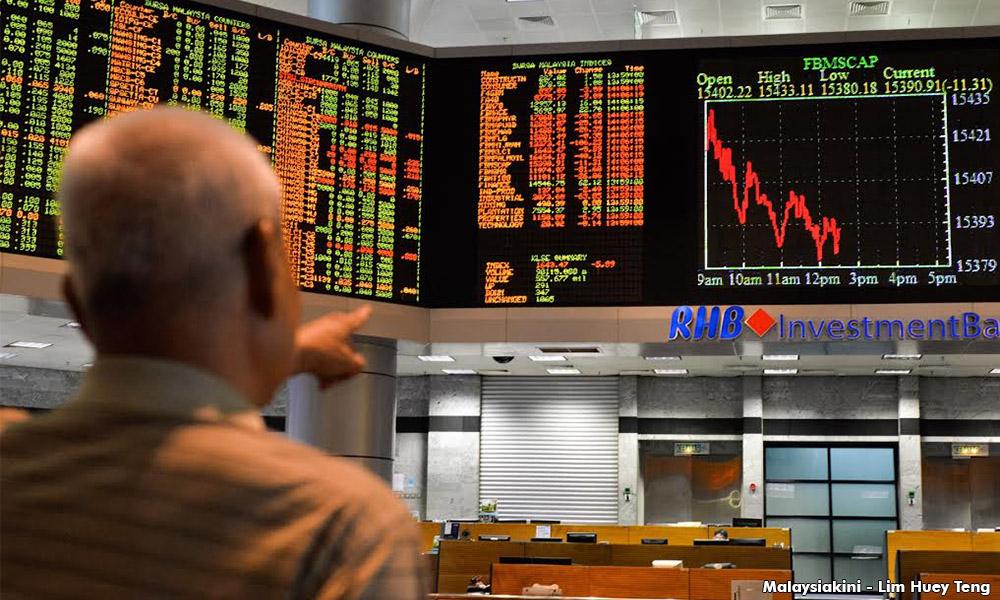
Published by Malaysiakini, image from Malaysiakini.
Economists the world over know that every variable counts, in tilting the economic order into a recession. The latter is defined as a contraction of two quarters.
Three of the latest variables or indicators employed to suggest a shift towards a potential global economic recession are: the 0.1 percent contraction of the GDP’s of Germany; the projected slow growth of China at 6 percent; and the US and UK government bonds that have seen a spike in the purchases of the 30-year bond, which has not witnessed since 1960.
Rana Foroohar, the global financial economist, affirmed yesterday in the Financial Timesthat there are other signs to point to a global economic slowdown; such as the paring down of consumer credit card debts by the American consumers; the lack of any spending spurts in an “unusual” summer; the weak data from the marketing purchasing index in US and Europe.
Foroohar may be right on all of the above early-warning signals but still wrong about what will happen.
To begin with, the US economy, to its credit is bound to weaken a wee bit since it has been growing non-stop for the last 119 months, often at a clip of 2 percent to 3 per cent. This is based on the records of Geo-political Futures and Maudlin Economics, both of which are backed by seasoned observers, especially George Friedman.
For instance, instead of adding 196,000 jobs in the last quarter, which was widely expected by the US economists, the US economy added 170,000 only; a figure once again confirmed by the Financial Times.
A shortfall of 26,000 blue and white-collar jobs, while not necessarily helpful, is nevertheless a sign of a US economy that is adjusting quite well to the on-again, off-again Sino-US tariff war that has been delayed to Dec 15, 2019.
By Dec 15, if the US and China cannot reach a deal, President Donald Trump is either obliged to slap a final 10 percent tariff, if not more, on China’s US$300 billion exports.
When the Dow Jones Index dropped by 800 points on Wall Street just a few days ago, the fear was triggered in the main by the twin possibility of US and Germany slowing down; coupled with the messiness of Brexit.
Nikkei Index too shedded some 600 points in light of what happened on Wall Street. Such fears are further overlapped by the massing of paramilitary forces in Shenzhen, China, right across the border from Hong Kong, which seems to imply the wearing down of patience in Beijing, as the demonstrators in Hong Kong has led to the cancellation of close to 1000 flights over the recent days alone.
But the US, German, and Japanese economies have yet to contract by two consecutive quarters. A correction in the stock market cannot be confused and conflated with the global financial crisis of 2008.
In that global financial crisis, which was triggered by a housing boom in the US, 90 percent of which brought on sheer debts, not true disposable income, the US economy petered off to create a large bottom. The huge amount of collateral debts and swaps between various banks made the economic recession all but inevitable.
But one must remember that through financial infusion like Quantitative Economic Easing of I, II and III, more money was released by the central banks all over the world to prevent a credit crunch, a feat helped by the then Prime Minister Gordon Brown of UK, subsequently US President Barack Obama, who both urged all the central banks in G20 and more to loosen their monetary policy.
Knowing that if they didn’t, the world would be hit by the Great Global Depression not seen since 1920, the financial authorities of the various countries willingly complied.
Foroohar is right to claim that the strong growth in the US is due to such policies. But she has also neglected another key dimension that led to the growth of the US economy: digitisation. Jeremiah Ouyang has christened what is happening in the DNA of the global economy as a “honeycomb” economy where all things left dormant can be used and shared, often through an app.
A tractor of the municipal council that is not being used as yet, for example, can be transferred to another location that needs it to undertake the necessary earthwork.
In fact, even if student loans in US pose a major threat, as close to US$3.5 trillion student debts remain unpaid, the future of education can be guaranteed by the likes of Coursera, edX.org and Udacity. Each of these online portals can shave the fees of the prospective students to the tune of 80-90 percent, period.
In other words, much as the US economy may be facing some headwinds, there are no certainties that the 2007 great global recession will repeat.
Even if it does, the Japanese economy is not doing all that bad either. Its government pension fund is at US$13 trillion; while its private pension fund is at a healthy 10 percent of the gross total of the former. Either way, Japan has a credit line of some US$14 trillion, with a lending interest rate that hovers between 0.65 percent to one percent.
What is more worrisome, however, is global politics. India has gone ahead to seize Jammu and Kashmir. China remains unrelenting in its claim that it is not locking up its own Hui Muslims and Uyghur ethnic groups, many of whom profess Islam as their article of faith.
The South China Sea has become a territorially contiguous area of the Indian Ocean. The major powers are making a beeline to conducting their freedom of navigation in South China Sea.
In the Persian Gulf, Tehran seems to be spoiling for a fight to force the US and Europe to the negotiating table, since the former cancelled the Joint Comprehensive Point of Agreement (JCPOA) in its entirety.
To the degree geopolitics is more unstable than global economics, which it is, the structural faultlines and fissures are bound to be here first, before there is any global economic recession. Malaysia needs to pull up its sleeves too.
Dr. Rais Hussin is President & CEO of EMIR Research, an independent think tank focused on strategic policy recommendations based upon rigorous research.

